
The keto diet, with its high-fat and low-carb approach, can shake up your gut health in interesting ways! On the plus side, cutting out carbs might reduce inflammation and benefit your gut if you have IBS. But here's the tricky part: lower fiber intake can lead to constipation and mess with your gut bacteria. You might feel bloated or experience the so-called "keto flu," featuring headaches and fatigue. Adding high-fiber veggies and fermented foods can help, but it's no walk in the park. Curious how you can balance these pros and cons and keep your gut happy? Keep going to find out more!
Key Takeaways
- The keto diet's low fiber intake can cause constipation and digestive discomfort.
- Reduced gut microbiome diversity is a potential downside of sustained keto dieting.
- High-fat intake may adversely alter gut bacteria composition.
- The keto diet can help reduce inflammation, potentially benefiting conditions like IBS.
- Maintaining proper hydration and electrolyte balance is crucial to alleviate digestive issues and "keto flu" symptoms.
Understanding the Keto Diet
The ketogenic diet, commonly known as the keto diet, is a high-fat, low-carbohydrate eating plan designed to induce ketosis, a metabolic state where the body utilizes fat as its primary energy source. It typically involves consuming about 70-80% fats, 15-25% proteins, and only 5-10% carbohydrates.
While the diet has gained popularity for weight loss and managing epilepsy, there are some keto misconceptions that need clearing up.
One common misconception is that the keto diet is an easy, one-size-fits-all solution. In reality, it requires careful planning and monitoring. Without proper balance, you might miss out on important nutrients, leading to potential deficiencies.
Another myth is that the keto diet is all about eating bacon and cheese. However, for dietary sustainability, it's essential to include a variety of healthy fats like avocados, nuts, and seeds.
Starting the keto diet can also cause the "keto flu," which includes symptoms like constipation and bloating. These side effects are due to the drastic reduction in carbs, and they can make the initial shift tough.
Maintaining this diet long-term can be challenging, but with the right approach, it can be a beneficial lifestyle change.
Fiber Intake Challenges
Switching to a keto diet can make it hard to get enough fiber because it cuts out many high-fiber foods like fruits and whole grains.
This lack of fiber can lead to digestive problems, and studies show that a lot of kids on the keto diet get constipated.
To help with these issues, it's important to eat low-carb, high-fiber veggies like leafy greens and avocados, and slowly adjust to the diet so your body has time to get used to it.
Reduced Fiber Sources
Adopting a keto diet often entails a drastic reduction in fiber-rich foods such as fruits, vegetables, and whole grains, posing significant challenges to maintaining adequate fiber intake. This can lead to some pretty serious digestive issues, considering fiber is essential for keeping our digestive system running smoothly.
Without enough fiber, many people on the keto diet experience problems like constipation. In fact, studies show that around 65% of children on the keto diet reported this uncomfortable issue.
When you cut out high-fiber foods, your gut microbiome—the good bacteria in your stomach—takes a hit too. This can lead to a less diverse gut microbiome, which is not great for your overall digestive health and immune system.
Digestive Discomfort Risks
While reduced fiber sources pose a challenge, the risks of digestive discomfort on a keto diet extend far beyond just the lack of fiber. The keto diet's severe restriction of carbohydrates, which drops to about 5-10% of total intake, often means cutting out fiber-rich foods like fruits, grains, and legumes.
This significant reduction in fiber can lead to a host of digestive issues. One main concern is keto constipation, a common complaint during the initial digestive adaptation phase. A 10-year study revealed that 65% of children on a ketogenic diet experienced constipation, showing how prevalent this issue can be.
Without sufficient fiber, normal bowel movements can be disrupted, leading to increased risks of bloating and other gastrointestinal discomforts.
Here are some key points to understand the digestive discomfort risks on a keto diet:
- Fiber Deficiency: Limited intake of fiber-rich foods can hamper digestive health.
- Keto Constipation: Many individuals experience constipation due to reduced fiber.
- Digestive Adaptation: The body undergoes significant changes that can lead to bloating and discomfort.
- Hydration Needs: Proper hydration and electrolyte balance are essential to mitigate these issues.
Understanding these risks helps in preparing for the digestive changes when starting a keto diet.
Mitigation Strategies
Managing fiber intake challenges on a ketogenic diet requires strategic food choices to promote gut health and mitigate digestive discomfort. One of the main issues with the keto diet is its low fiber content, since it restricts high-carb foods like fruits, vegetables, and whole grains. This can lead to problems like constipation and bloating. But don't worry, there are ways to handle this!
First, try incorporating low-carb, high-fiber veggies like spinach, kale, and broccoli. These are keto-friendly and can help keep things moving smoothly.
Plus, adding fermented foods like sauerkraut and kimchi can introduce beneficial bacteria to your gut, which helps digestion. Prebiotic fibers, found in foods like garlic and onions, can also support your gut health by feeding those good bacteria.
Staying hydrated is super important too. Drinking plenty of water and keeping your electrolytes balanced can make a big difference in how you feel.
Also, instead of jumping into the keto diet all at once, try easing into it gradually. This gives your gut microbiome time to adjust, reducing the chances of digestive discomfort.
Regularly checking and tweaking your food choices can help you stay on track and feel great.
Gut Microbiome Changes
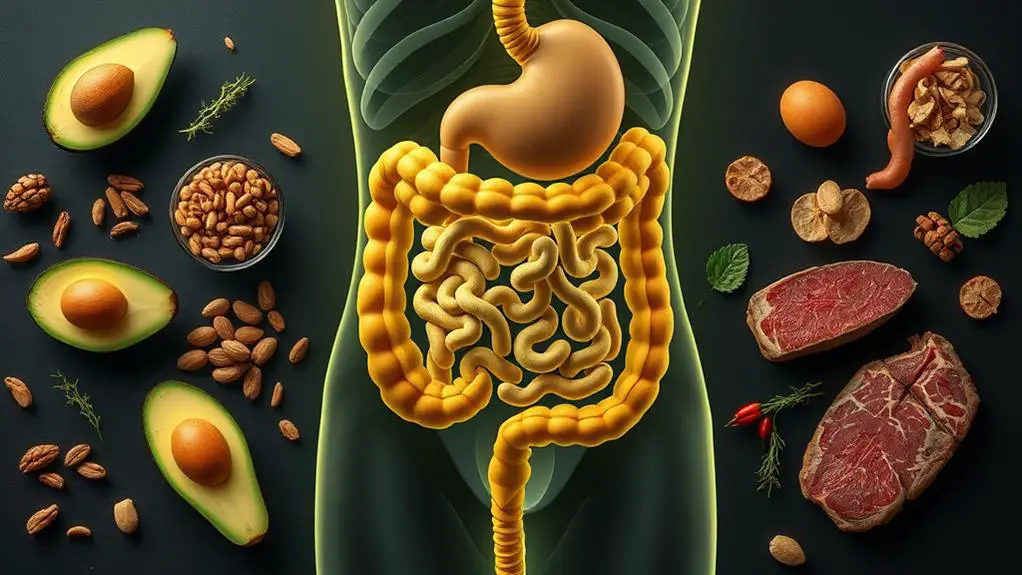
The ketogenic diet can greatly alter the gut microbiome, resulting in a composition that may not be conducive to ideal gut health. When you switch to a keto diet, you might not get enough fiber, which is vital for maintaining microbiome diversity. This diversity is essential for a healthy gut, and without it, your digestive and immune systems could suffer.
Research has found that children on a keto diet saw significant changes in their gut microbiome composition, with 68% experiencing lower bacterial diversity. A less diverse microbiome can lead to various health issues, including digestive problems and a weakened immune system.
To better understand how the keto diet impacts gut health, consider the following points:
- Reduced Bacterial Diversity: A variety of bacteria in your gut helps maintain balance and overall health. The keto diet may reduce this diversity.
- High-Fat Intake: Consuming a lot of fat can negatively affect your gut bacteria, potentially leading to less favorable compositions.
- Fiber Deficiency: The keto diet often lacks fiber-rich foods, which are necessary for feeding beneficial gut bacteria.
- Conflicting Research: Some studies show negative impacts on gut health, while others are inconclusive, highlighting the need for further research.
Inflammation and Keto
Reducing inflammation is one of the potential benefits of adopting a ketogenic diet, especially for individuals suffering from digestive disorders such as Irritable Bowel Syndrome (IBS). Keto inflammation relief can be significant, as low-carb diets have been shown to improve symptoms in these patients. Very-low-carb diets, including keto, are associated with decreased inflammation, potentially providing relief for conditions like Crohn's disease.
However, the high-fat content in the keto diet can sometimes lead to unfavorable changes in the gut microbiome. This might actually increase inflammation over time. It's like trying to put out a fire with water but accidentally soaking everything around it.
| Pros | Cons |
|---|---|
| Reduces inflammation markers | High-fat content may harm microbiome |
| Symptom improvement for IBS | Reduced gut microbiome diversity |
| Potential relief for Crohn's | Lack of dietary fiber |
| Low-carb diets benefit gut healing | Potential long-term inflammation |
| High-fat, low-carb impact | Compromised immune balance |
Interestingly, the restrictive nature of the keto diet might compromise gut microbiome diversity. This diversity is essential for maintaining balanced immune responses and managing inflammation. Additionally, a lack of dietary fiber from fruits and vegetables can exacerbate inflammation and digestive issues. Balancing the diet with low-carb, high-fiber foods can help manage keto inflammation and support gut healing.
Digestive Disorders and Keto
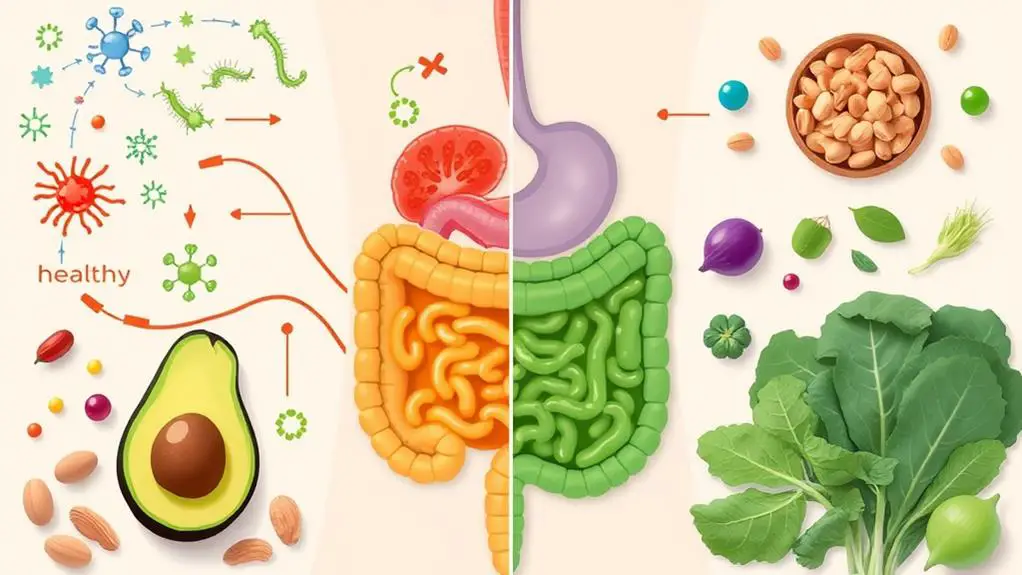
Adopting a ketogenic diet can present unique challenges for individuals with digestive disorders. The keto diet's low fiber intake, due to keto restrictions on many plant-based foods, often leads to digestive issues like constipation, bloating, and diarrhea.
In fact, a 10-year study found that 65% of children on the diet experienced constipation. Gastrointestinal symptoms are also common during the initial phase of the diet, known as the "keto flu," which can last from a few days to a week.
To better manage these digestive challenges, consider the following tips:
- Incorporate Fiber-Rich Vegetables: Adding low-carb, fiber-rich vegetables like spinach and broccoli can help mitigate constipation and improve overall gut health.
- Stay Hydrated: Drinking plenty of water is essential to help move fiber through the digestive system, reducing bloating and discomfort.
- Monitor Gut Health: Regularly check your digestive health and symptoms, as individual responses to the keto diet can vary notably.
- Consult a Professional: Given the keto diet's potential to alter the gut microbiome and reduce its diversity, consulting a healthcare provider for personalized advice is vital.
Hydration and Electrolytes
Proper hydration is essential on the keto diet, especially to combat the "keto flu," a group of symptoms like fatigue and dizziness that happen when your body adjusts to fewer carbs.
Because low-carb diets cause your body to lose more water, drinking enough fluids is key to staying healthy.
Balancing electrolytes, like sodium and potassium, helps prevent muscle cramps and keeps your energy up, making sure your digestive system works smoothly.
Importance of Hydration
When commencing a keto diet, maintaining adequate hydration becomes a paramount concern due to the body's increased excretion of water and electrolytes during the initial phase of ketosis. This can leave you feeling like a dried-out sponge.
To stay hydrated, you need to adopt some smart hydration strategies and find good electrolyte sources.
Here are four key points to contemplate:
- Drink More Water: Aim to drink more water than usual. The keto diet can make you lose water quickly, so keeping a water bottle handy is a must.
- Broth and Electrolyte Drinks: Sipping on broth or electrolyte-infused drinks can help replenish lost electrolytes. These drinks are like a lifeline for your body, helping you avoid headaches and fatigue.
- Electrolyte-Rich Foods: Incorporate foods high in electrolytes, such as avocados and leafy greens, into your meals. These foods are not only tasty but also help maintain a good balance of sodium, potassium, and magnesium.
- Monitor Your Intake: Keep an eye on how much fluid you're consuming. It sounds simple, but it's easy to forget. Monitoring helps guarantee you're not becoming dehydrated.
Balancing Electrolyte Levels
Balancing electrolyte levels is critical when shifting to a keto diet, as the body's movement towards ketosis precipitates significant water and mineral loss. When you cut down on carbs, your body loses a lot more water, which can make you dehydrated if you're not careful. This is why it's super important to drink plenty of fluids.
Electrolyte imbalances are pretty common when you first start the keto diet. Your body starts excreting more minerals like sodium, potassium, and magnesium. This can lead to symptoms like muscle cramps, fatigue, and headaches, often called "keto flu." To fight this, you need to focus on electrolyte sources and possibly consider supplementation strategies.
For example, you might need between 3,000-5,000 mg of sodium, 2,000-4,000 mg of potassium, and 300-400 mg of magnesium each day. Foods rich in these minerals, like leafy greens, nuts, and seeds, can be great electrolyte sources. Sometimes, though, you might need to take supplements to hit your daily targets.
Keeping an eye on your electrolyte levels can make a big difference. It can help stop those annoying cramps and even help with digestion, preventing issues like constipation.
Balancing these essentials helps keep you feeling good and staying on track with your keto goals.
Nutrient Deficiencies
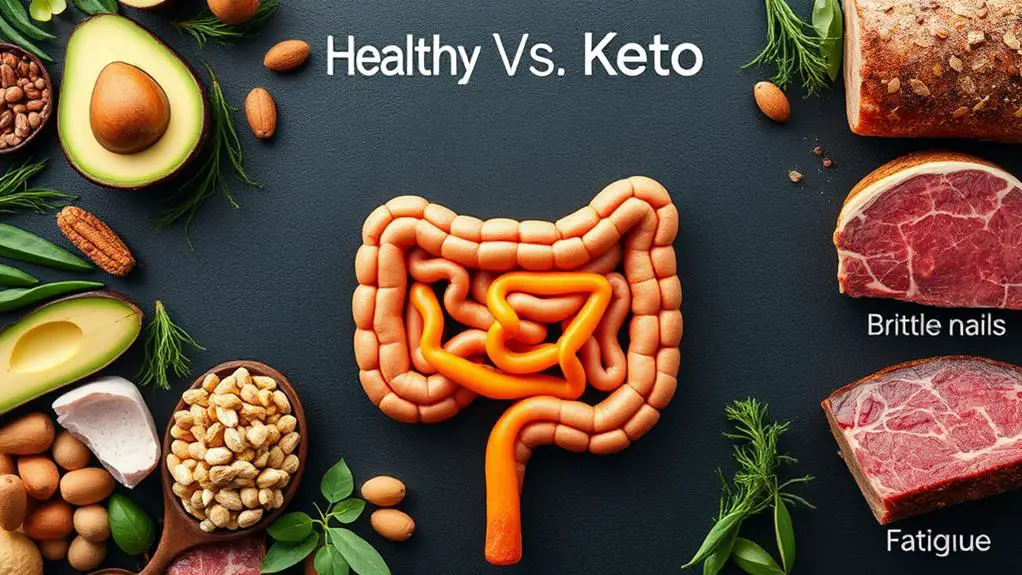
How does the restrictive nature of the keto diet impact nutrient intake? By limiting many nutrient-dense foods, the keto diet can result in deficiencies of essential vitamins and minerals. Key nutrients such as calcium, vitamin D, and magnesium often fall short. This is mainly due to the diet's impact on nutrient absorption and its lack of dietary diversity, which can pose significant health risks.
A study revealed that very low carb diets only provide adequate amounts for 12 out of 27 essential nutrients.
So, how can you guarantee you're getting what you need? Here's a closer look:
- Nutrient Absorption: The keto diet may impair the absorption of certain vitamins and minerals, especially those found in fruits and whole grains.
- Vitamin Sources: With limited food choices, finding rich sources of vitamins like calcium and vitamin D becomes challenging, increasing the risk of deficiencies.
- Mineral Balance: Maintaining a proper mineral balance is tough without the variety offered by a more diverse diet, which could lead to imbalances.
- Dietary Diversity: The lack of fibrous foods can lead to inadequate fiber intake, causing gastrointestinal issues like constipation and further complicating nutrient absorption.
Choosing whole foods over processed options can help mitigate these risks, guaranteeing better nutrient intake and overall health.
Digestive Adaptation Period
Shifting to a ketogenic diet entails a significant adjustment period for the digestive system, commonly referred to as the "keto flu." This phase typically spans from a few days to a week, during which the body acclimates to a drastic reduction in carbohydrate intake. During this time, you might experience adaptation symptoms like fatigue, headaches, dizziness, irritability, nausea, and constipation. These symptoms arise as your body shifts from using carbs for energy to burning fat.
One vital aspect of managing the keto flu is maintaining electrolyte balance. Since cutting carbs often leads to reduced hydration levels, it's essential to stay hydrated. Drinking plenty of water and replenishing electrolytes with things like salt, potassium, and magnesium can help alleviate these symptoms and support digestive health.
A gradual adjustment to the keto diet can also ease digestive strain. Instead of jumping straight into low-carb eating, try slowly reducing your carb intake over a week or two. This strategy can make the adaptation period less intense and more manageable.
While this period can be challenging, understanding and preparing for these changes can make your keto journey smoother and more comfortable.
High-Fiber Keto Foods
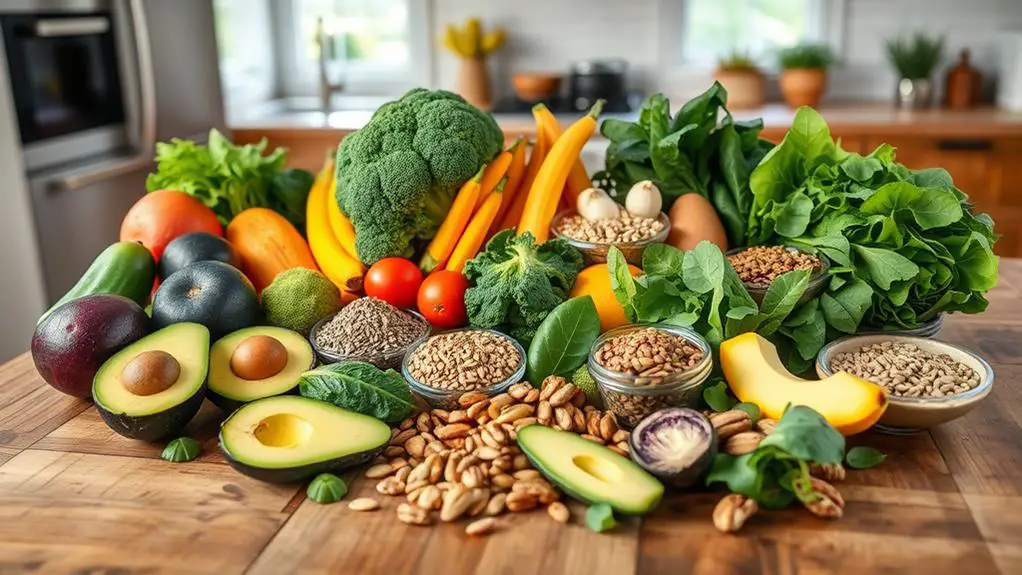
Let's talk about high-fiber keto foods that can keep your gut happy while sticking to the diet.
Low-carb vegetables like spinach, kale, and broccoli are fantastic because they offer fiber without breaking the carb bank.
Plus, munching on nuts and seeds like chia and flaxseeds, or adding a bit of psyllium husk to your meals, can really help keep things moving smoothly.
Low-Carb Vegetables
Low-carb vegetables such as spinach, kale, broccoli, and cauliflower play a pivotal role in maintaining digestive health on the keto diet.
These veggies not only comply with the diet's carbohydrate restrictions but also provide essential fiber, which is vital for gut health. The benefits of keto vegetables are numerous, especially in combating common digestive issues like constipation and bloating.
Including these fiber-rich foods in your meals can support a diverse gut microbiome, which is essential for overall wellness.
To make the most out of your keto diet, try incorporating these vegetables into your fiber-rich recipes:
- Spinach: Rich in iron and fiber, spinach can be used in salads, smoothies, or sautés, enhancing both taste and nutrition.
- Kale: Known for its high fiber and antioxidant content, kale is perfect for making crispy chips or adding to soups.
- Broccoli: This versatile vegetable can be steamed, roasted, or added to casseroles, providing a fiber boost and essential nutrients.
- Cauliflower: A keto staple, cauliflower can be transformed into rice, pizza crusts, or mashed potatoes, offering endless culinary possibilities.
Nut and Seed Options
Nuts and seeds stand out as exceptional high-fiber options within the keto diet, offering a balance of healthy fats and essential nutrients. Almonds, for instance, are a great choice, providing about 3.5 grams of fiber per ounce. This nut benefits your diet by not only supporting gut health but also offering a crunchy, satisfying snack.
Chia seeds are another powerhouse, packing a whopping 10 grams of fiber per ounce while staying low in carbs. They're tiny but mighty, helping to keep your digestive system running smoothly.
Flaxseeds, too, are fantastic, offering up to 8 grams of fiber per ounce along with omega-3 fatty acids, which can help reduce inflammation. Sprinkle them on your salads or mix them into smoothies for an easy fiber boost.
Pumpkin seeds, or pepitas, are also worth mentioning. They contain about 1.1 grams of fiber per tablespoon and are rich in magnesium, which can help with digestion and prevent constipation.
Incorporating a seed variety into your diet guarantees you get a broad spectrum of nutrients. According to the Keto Microsetta Initiative, eating 30 or more different plant foods weekly can optimize your gut microbiome health.
Fiber-Rich Supplements
Amid the stringent carbohydrate restrictions of the keto diet, incorporating fiber-rich supplements such as psyllium husk or chia seeds becomes vital for maintaining digestive health.
Without enough fiber, keto dieters often experience digestive discomfort, like constipation. Fiber sources like psyllium husk and chia seeds help promote regular bowel movements, keeping things moving smoothly.
High-fiber keto foods can also play an important role. Avocados and leafy greens not only provide essential nutrients but also help maintain a diverse gut flora, which is key for overall health.
Meeting the recommended daily fiber intake of 25-30 grams can be tough on a keto diet, but fiber-rich supplements and high-fiber foods like flaxseeds and hemp hearts can help bridge the gap.
Here's a quick list of how these fiber sources benefit your gut health:
- Psyllium Husk: Aids in digestive balance and prevents constipation.
- Chia Seeds: Provides fiber benefits while maintaining low-carb intake.
- Avocados: Nutrient-rich and great for gut flora diversity.
- Leafy Greens: Essential for maintaining gut health and overall well-being.
Long-term Gut Health
Long-term adherence to the keto diet may pose significant challenges to gut health, primarily due to its impact on the gut microbiome's diversity. The gut microbiome, which is essential for overall health, thrives on a diverse diet rich in fiber.
However, the keto diet's restrictive nature means fewer fiber-rich foods, leading to a less diverse microbiome. This imbalance in the microbiome can reduce nutrient absorption and contribute to diseases like ulcerative colitis and Crohn's disease.
Moreover, a study found that 68% of children on the keto diet had lower bone mineral density after just six months. This suggests that their gut health and ability to absorb nutrients were adversely affected.
The keto diet only supplies adequate amounts of 12 out of 27 essential nutrients, which can lead to deficiencies over time. These deficiencies can further harm gut health, making it harder for your body to function properly.
Ongoing research is vital to fully understand the long-term effects of the keto diet on gut health, especially regarding the balance of gut bacteria and inflammation levels.
For now, it's clear that while the keto diet has short-term benefits, its long-term impact on gut health requires careful consideration.
Personalized Keto Approaches

Personalized keto approaches offer a tailored solution to the challenges posed by the traditional keto diet, considering individual metabolic responses, health conditions, and dietary preferences. This customization guarantees the diet is not just effective, but also sustainable and gentle on your gut.
Here are four ways to make the keto diet work better for you:
- Incorporate Variety: Adding a mix of low-carb, high-fiber foods like leafy greens and avocados supports a healthy gut microbiome. This variety helps your digestive system stay happy and balanced.
- Monitor Biomarkers: Keeping an eye on things like ketone levels and gut microbiome composition can help you tweak your macronutrient ratios. This can lead to better digestive health and overall well-being.
- Targeted Strategies: Sometimes, including higher-carb days or specific keto strategies can make the diet more manageable. This can reduce digestive discomfort while still keeping you in ketosis, making it easier to stick to the plan.
- Professional Guidance: Consulting with healthcare professionals or nutritionists can help tailor your keto diet. They can assure all your nutrient needs are met and that your digestive health stays a top priority.
With keto customization, you can enjoy the benefits without the common pitfalls.
Frequently Asked Questions
Is the Keto Diet Good for Gut Health?
The keto diet's impact on gut health is mixed; reduced fiber intake can disrupt gut microbiome balance, potentially causing digestive issues. Conversely, certain individuals with IBS may experience symptom relief. More research is needed for definitive conclusions.
What Are the Negative Health Effects of Keto Diet?
The keto diet can negatively impact health by causing keto inflammation, altering the gut microbiome, leading to constipation, nutritional deficiencies, increased kidney stone risk, lower bone mineral density, and potential hormonal imbalances affecting menstrual cycles and fertility.
What Are the Pros and Cons of a Keto Diet?
The keto diet offers notable benefits such as rapid keto weight loss and reduced keto cravings. However, it also presents challenges, including potential nutritional deficiencies, digestive issues, and adverse impacts on gut microbiome composition, necessitating careful dietary planning.
Can Keto Cause Digestive Problems?
Yes, the keto diet can cause digestive problems, primarily due to reduced fiber intake. Incorporating keto-friendly fiber sources and digestive enzymes can alleviate issues such as constipation, bloating, and diarrhea, improving overall gut health.
Conclusion
The keto diet has both potential benefits and drawbacks for gut health. While it may reduce inflammation and help manage some digestive disorders, it also challenges fiber intake and can alter the gut microbiome. The digestive system requires an adaptation period, and high-fiber keto foods can help. Long-term impacts on gut health remain uncertain, making personalized approaches essential. Careful consideration and professional guidance are recommended to balance the pros and cons effectively.
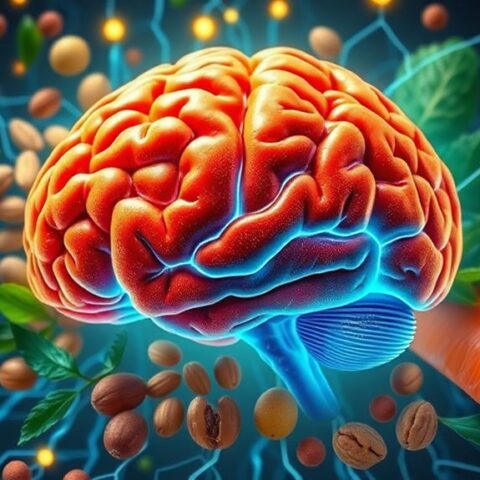









No Comments